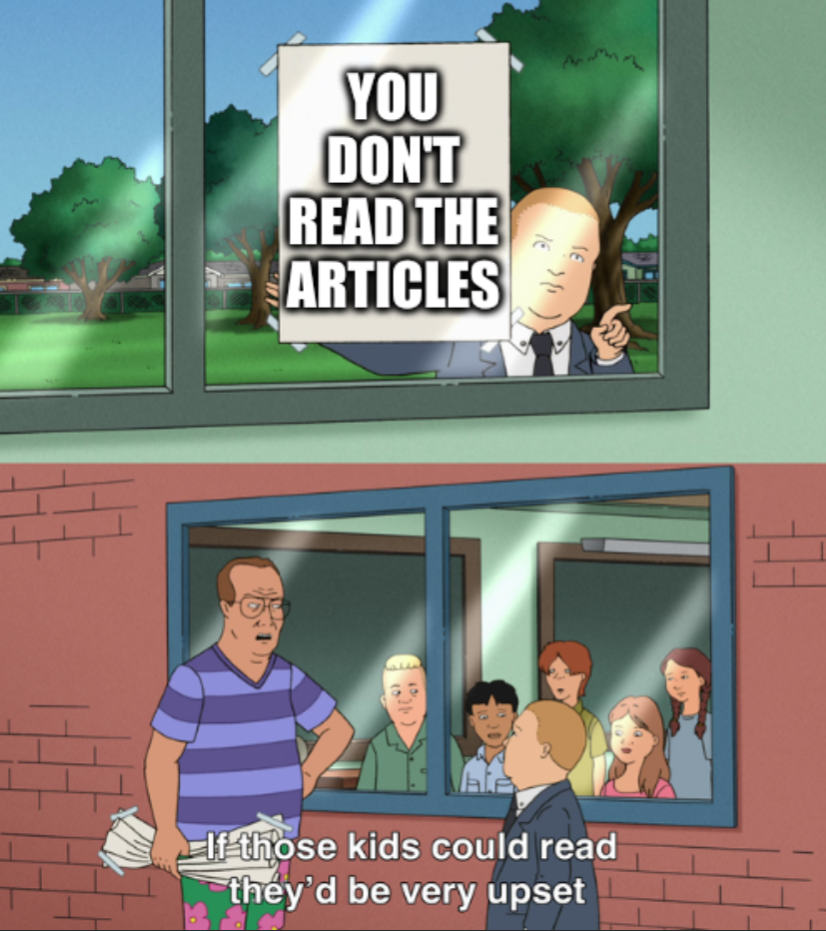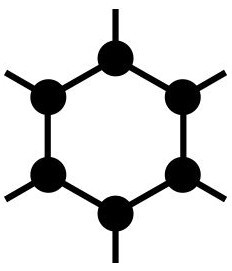I’ll be honest, I don’t even want to read articles anymore. Its just crazy cabinet nominees every time. Wars happening. Nothing I can control. I just post something sarcastic or jokes in the comments. The only thing I care is if a hurricane is headed in my direction.
Y’all actually read all this shit? How does anyone have the energy?
I didn’t read your question but “yes”
But actually, I don’t for political stuff because it is so freaking depressing, and you can’t affect it much.
I love reading science articles though!
Sometimes. I’ll often read the comments to get the highlights, but I’ll also read the article if it interests me or when I need to know more details.
And let’s be honest: 90% of news articles don’t contain more relevant information for me than the headline.
“Politician said X” has almost never any effect on my life.
I just scrolled through the front page of Der Spiegel. The first 10 articles are speculations about campaign decisions, analyses of things already known, and opinion pieces of some mildly knowledgeable people.
Yeah, that’s mostly irrelevant. Yes, some background would be nice, but I don’t have time to read about everything that isn’t of consequence for me anyway.
Hell a lot of them don’t contain accurate information either. Especially AI slop.
Same here but with some tuning:
I read comments very carefully. If there isn’t a summary bot I don’t trust comments as true anymore. If the publisher prevents reader mode (firefox) or requires either a subscription or non-essential cookies: Keep your secrets.
Also, if the headline is too hard a clickbait, I skip it as well.
If the headline sounds interesting I’ll read the article.
Same, but replace ‘article’ with ‘comments’
Same
I read the headline, I read the discussion. If the discussion convinces me to read the article myself, I will. If there’s broad consensus, generally it’s not worth my time to confirm what I’ve learned already.
I do this for several reasons:
-
Ads. Even with ad blocker the frequent text breaks are exhausting.
-
Overeditorialization. I want the facts, not a narrative. I get why that’s the way the information is presented, but my time is limited and I’m not into it. Same reason I don’t really like (non-nature) documentaries
-
Perspective. The author has their own unitary perspective, and I prefer to consume multiple perspectives on an issue so I can explore the problem/solution space.
If it’s short, data heavy, and plays nice with Simplified Mode then I’ll read it real quick, but the less navigation I have to do to obtain information the better.
-
Worked for a newspaper for many years. This is a great question.
Good headlines are both intended to give reasonable summaries and drive readers toward articles they’d like to read, because newspapers – and news media congregation systems in general – don’t have a true table of contents, only a series of categories under which article types live. Headlines, at a glance, function as a table of contents in newsprint formats because of this: you can scan for what you find interesting, but don’t have to intake the whole newspaper page to understand what’s being reported.
App scrolling through headlines, then, is functionally the same thing. Just a different UX, is all.
What I find really worrying though is the trend to pick headlines that don’t summarize, but sensationalize and twist the content. And that’s not just a tabloid problem.
I know that this is designed to generate more clicks, but since most people skip most of the content, only the headlines stick. And if these are wrong, misinformation will stick.
If I’m going to comment then I read. Always seeing mfs asking questions answered in the article or raging about shit they imagined based on the headline alone. It’s embarrassing
(👉👈)
Or maybe people don’t want to click tracking link
OR
they want to seed a discussion on fedi ;)
I always read the headline and if the headline is interesting I’ll read the article.
One thing I don’t do is voice my opinion about an article without reading it.
My conservative inlaws read headlines aloud like it’s a fact without reading the article.
And make up a scenario about the headline. Its like angry improve for distressing yourself.

I just read the comments.
I try to, when I have the time, but I don’t sweat it if I don’t, I just try to avoid forming too many opinions about the topic.
Also, a good chunk of the time I try, I get paywalled. Which I can usually bypass if I’m on PC, but that’s not really feasible on mobile.
Props to all the heroes copying the article into the post, or pointing out when the headline is misleading.
I don’t, I just try to avoid forming too many opinions about the topic.
The best way to handle most things in life. Do what you want, just always assume you know nothing about a topic.
Interestingly, I read the full article more often now on lemmy vs back on reddit. Maybe because there aren’t a ton of comments on posts here so I don’t have context and need to just read it myself. Either way, it’s better because I get to form my own opinion instead of basing it off on other people’s comments.
Either way, it’s better because I get to form my own opinion instead of basing it off on other people’s comments.
Ohh the irony
In the off chance I do try to read the article, the ridiculous amount ads and popups remind me why I just read headlines.
uBlock Origin, my friend. Works on Firefox on any computer os and Android Firefox. If iPhone, theres Brave.
And pihole.
I read the article if when I open the link, I am not immediately slapped in the face with ads that aren’t blocked by uBlock Origin, an ad block blocker, or a paywall. But I’m not also not reading multiple articles on the same exact topic just because they come from different outlets. 9 times out of 10, they’re exactly the same but with slight variation on verbiage because they all took the same original information from the actual original source and just re-worded it.
If I find the headline interesting, I might read the article if I have enough time.
Before I comment on things, I do at the very least skim them to confirm that I’m commenting on what the article actually says, not just the headline.











